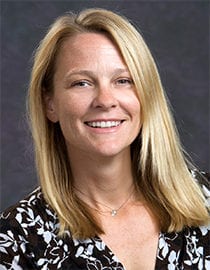
By Andrew Cohen
Kristen Holmquist wears more professional hats than just about anyone at Berkeley Law. She juggles three courses during the school year, directs the Academic Skills Program, serves as Associate Director of Experiential Education and works closely on equity and inclusion projects.
“I honestly have no idea how she does it,” says Eileen Sherman ’18, who has taken two of Holmquist’s classes and is one of her student tutors. “She teaches complex issues of law in the most clear and straightforward way, she really cares about all of her students, and she gives each of them an equal chance to succeed.”
Those attributes are some of the reasons why Holmquist will receive this year’s Rutter Award for Teaching Distinction at a ceremony this spring. Established in 1995 by the late William Rutter—a philanthropist, lawyer, educator and author—the award honors an instructor who inspires students and demonstrates a deep commitment to teaching.
“It’s a huge honor because what I do in the classroom every day is the most important part of my job,” Holmquist said. “Building relationships with students, watching them learn and learning from them is so rewarding. Also, when I look at the people who have received this award, they are among my teaching heroes. To share this honor with them feels pretty great.”
Holmquist came to Berkeley Law in 2008 to guide its Academic Skills Program after spending six years in that role at UCLA Law. She helps dozens of student tutors set weekly lesson plans and create exercises that bolster exam-taking abilities. First-year students receive instruction from upperclassmen on how to read a case, extract a rule and perform related legal analysis.
In the classroom, she is teaching Constitutional Law and Lawyering as Problem Solving this semester after teaching Estates and Trusts during the fall.
“Professor Holmquist is so human,” Sherman said. “She has an enormous capacity to empathize with students no matter what they may be struggling with—school or otherwise.”
Jasleen Singh ’17 echoed that sentiment, noting an “incredible talent for guiding students through a concept.” Singh, who has taken two of Holmquist’s classes, appreciates how she “welcomes all discussion and viewpoints and empowers students to talk through their logic in a welcoming, non-judgmental way. She’s there for them both as a professor and mentor.”
An innovative approach
Holmquist hit the ground running at Berkeley Law, quickly expanding and improving how it supports the development of first-year students’ academic skills. That work included developing and piloting a pre-orientation program that offers incoming students a helpful week-long introduction to law school.
“I’m incredibly proud of the way that students and faculty alike have come to think of academic support as an integral part of our curriculum,” she said. “With our pre-orientation program, it’s just phenomenal to give students—who are largely the first in their families to go to college—valuable exposure to what it is they’re embarking on. They build a peer network, create important lines of support and form early relationships with faculty and staff.”
Named Associate Director of Experiential Education in 2014, Holmquist has also helped lead a detailed process through which Berkeley Law identifies savvy ways to give its students pragmatic training. Interim Dean Melissa Murray called her “a driving force who works full tilt to create more opportunities for vital hands-on experience, and to implement courses and teaching techniques that buoy our students’ confidence and capabilities.”
Holmquist said she likes teaching varied courses “because they feed different parts of my intellectual curiosity.”
“While it’s true that I’d present material differently in a rules-oriented course like Estates and Trusts compared to Constitutional Law, it’s not true that students are going to approach their learning differently in each class,” she said. I still ask myself, ‘How do I scaffold this so students are getting the most out of it?’”
Having long infused experiential techniques in her doctrinal courses, Holmquist now sees more of her colleagues doing the same. Her arrival at Berkeley coincided with the economic downturn of 2008—which led to legal employers increasingly demanding young lawyers with meaningful practical experience.
“Over the last eight years, what I care about and what drives me as a teacher has been ascendant—how law students learn, and how what we’re doing in the classroom ultimately relates to what kind of professionals our graduates will be,” she said. “I’ve been lucky to ride that wave, which has placed more emphasis on experiential education, while thinking about what competencies our students need to become successful lawyers.”